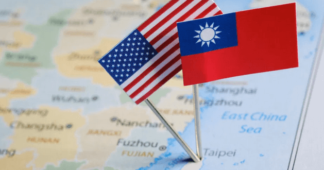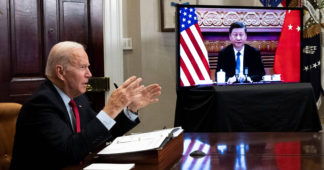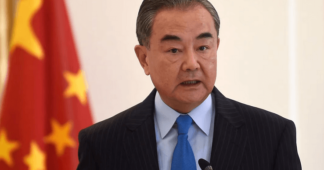Ultra-hawks in Congress want Biden to commit to going to war with China if it invades Taiwan
Posted on
Categories President Biden on Tuesday told reporters that there has been no change in the US’s strategic ambiguity policy on Taiwan.
“The policy has not changed at all,” Biden said. Under the policy, the US will not commit to defending the island in the event of a Chinese invasion.
Biden’s clarification came after he told reporters on Monday that the US would intervene to defend Taiwan, comments that were quickly walked back by the White House. “Yes. That’s the commitment we made,” Biden said when asked if he would get involved militarily to defend Taiwan.
While known for his frequent gaffes, Biden’s pledge to defend Taiwan appeared to be a change in US policy as the comment was made during a high-profile visit to Japan, where the president was expected to take a firm stance against Beijing. But the White House insisted that Biden meant the US would support Taiwan by supplying it with weapons, which Washington has been doing since it severed diplomatic relations with Taipei in 1979.
Biden’s comments on Taiwan overshadowed new initiatives he announced during his first trip as president to Asia. His pledge to defend Taiwan also drew heavy criticism for stoking tensions with China while the US is so involved in the war in Ukraine, which risks provoking Russia, as both Beijing and Moscow are nuclear powers.
On the other side, ultra-hawks in Washington were happy to see Biden appear to commit to going to war with China over Taiwan. “Does anyone at the White House actually respect the words of [President Biden],” Rep. Adam Kinzinger (R-IL) wrote on Twitter. “Biden said we would defend Taiwan, and the staff AGAIN walks back the President’s own words! He needs to fire everyone who does this.”
Sen. Tom Cotton (R-AR) released a statement calling for Biden to abandon the strategic ambiguity policy. “I’ve long said that we should change our Taiwan policy from ‘strategic ambiguity’ to ‘strategic clarity’: the United States will come to the defense of Taiwan in the event of a Chinese attack,” Cotton said.
Sen. Lindsey Graham (R-SC) said Biden was right to say the US will fight for Taiwan. “President Biden’s statement that if push came to shove the US would defend Taiwan against communist China was the right thing to say and the right thing to do,” he wrote on Twitter.
It’s not just Republicans that want the US to commit to going to war over Taiwan, some Democrats also favor changing the policy. Rep. Elaine Luria (D-VA) is one of the biggest proponents of giving the president war powers for Taiwan if China invades.
Republicans have introduced legislation that would give Biden war powers for Taiwan, known as the Taiwan Invasion Prevention Act. Sen. Rick Scott (R-FL) introduced the bill in the Senate and called for its passage after Biden made his comment on defending Taiwan. “The Senate should take Biden at his word, end the confusion and pass my Taiwan Invasion Prevention Act to clearly say that we have Taiwan’s back,” Scott said.
We remind our readers that publication of articles on our site does not mean that we agree with what is written. Our policy is to publish anything which we consider of interest, so as to assist our readers in forming their opinions. Sometimes we even publish articles with which we totally disagree, since we believe it is important for our readers to be informed on as wide a spectrum of views as possible.











